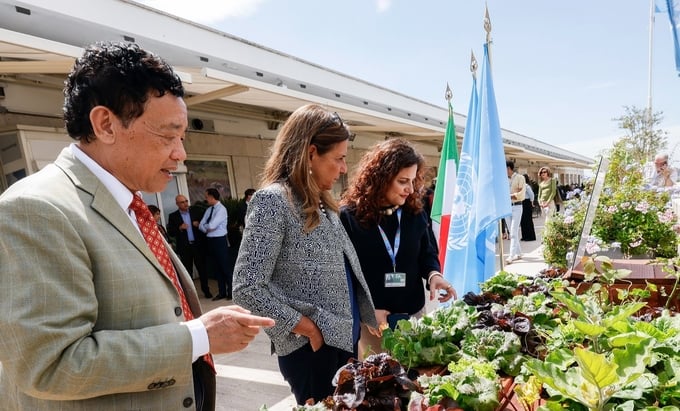November 25, 2025 | 20:18 GMT +7
November 25, 2025 | 20:18 GMT +7
Hotline: 0913.378.918
November 25, 2025 | 20:18 GMT +7
Hotline: 0913.378.918

FAO Director-General QU Dongyu and Rector of La Sapienza University of Rome Antonella Polimeni attending the inauguration of new hydroponic garden at FAO headquarters (Terrace).
The Food and Agriculture Organization of the United Nations (FAO) and La Sapienza University of Rome have further consolidated their research collaboration in the field of sustainable agriculture with the inauguration of a hydroponic garden on the FAO terrace, the result of the study of new water-based growing techniques.
The innovative garden, sponsored by La Sapienza University, the Mountain Partnership Secretariat and the Italian Development Cooperation, introduces innovative techniques that mark a step forward in traditional hydroponics.
The garden, which complements the one installed in 2021 - a result of the already existing partnership between the institutions - allows tap water to be used, eliminating the need for demineralized water and thus reducing the waste of resources. Only organic fertilizers are used in it, reducing the system's ecological footprint - microorganisms dissolved in the water interact with the plants, increasing their resistance to stressors such as high temperatures and pests. In addition, the system is designed for outdoor use, eliminating the need for artificial light used in conventional hydroponics, thus maintaining exceptionally low daily energy consumption. Finally, the garden is built with 90 percent-certified sustainable wood, minimizing the use of plastic used instead in conventional hydroponic systems.
In his keynote address at the ceremony, attended by La Sapienza University Rector Antonella Polimeni and the Deputy Permanent Representative of Italy to FAO Stefania Costanza, the FAO Director-General defined hydroponic agriculture as a combination of traditional and modern technology. He also emphasized the importance of a fruitful and ongoing dialogue between Academia and FAO, which would benefit both parties.
The hydroponic garden will serve as a test bed for research exploring the potential for improved resource management in soilless agriculture that can be an alternative or supplement to conventional agriculture, with potential applications in areas with scarcity of water and arable soil, such as mountains.
During the ceremony, the FAO Director-General and the Rector of La Sapienza University, renewed collaboration on FAO's flagship programme, Globally Important Agricultural Heritage Systems (GIAHS) and the Mountain Partnership, with the hydroponic garden, as set out in the Memorandum of Understanding signed in December 2023.
(FAO)

(VAN) Brazil's COP30 presidency pushed through a compromise climate deal on Saturday that would boost finance for poor nations coping with global warming but that omitted any mention of the fossil fuels driving it.

(VAN) Poultry farmers in the UK have been warned that they could face one of the worst winters yet for bird flu.

(VAN) Prices of main-crop paddy have risen sharply, with jasmine rice hitting 16,100 baht per tonne — the highest level in years.

(VAN) In Brazil, FAO unveiled a series of reports and initiatives showing how sustainable agrifood systems are a solution to the climate crisis.

(VAN) With names like neodymium and dysprosium, rare-earth elements sound exotic — and their perceived scarcity has only added to the mystique.

(VAN) In a new study published in Trends in Biotechnology, researchers used a gene-editing technology called CRISPR to increase a fungus's production efficiency and cut its production-related environmental impact by as much as 61%- all without adding any foreign DNA.

(VAN) A top official in Beijing’s Cop delegation says China is committed to clean energy – but US’s absence is a problem.